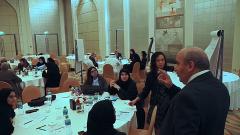Ministry Of Health & Prevention Hosts Workshop On Developing National Strategic Framework For Climate Change Impacts On Health
The Ministry of Health and Prevention (MoHAP) recently hosted a workshop on the impact of climate change on health and the development of a national strategic framework in this regard.
Held in the presence of H.E. Dr. Hussein Abdel-Rahman Al-Rand, Undersecretary of the Ministry’s Health Assistant Sector, Health Centers and Clinics and Dr. Nada Al Marzouqi, Director of MoHAP’s Preventive Medicine Department, the event witnessed the participation of representatives of the Ministry of Climate Change & Environment, besides the country’s concerned authorities and sectors.
Dr. Al Rand pointed out that the workshop aims at unifying the country’s exerted efforts in this critical matter, and also asserts MoHAP’s commitment to developing a national strategic framework and an action plan to reduce health consequences of the climate change in the country.
“MoHAP is keen on strengthening the efficiency of its preventive health programmes and achieving resilience to climate change, as well as detection of the burdens of disease associated with climate change and preparedness for facing them,” he added.
Al Rand pointed out that health impacts associated with carbon co-pollutants, such as cardiovascular and respiratory disease, as well as health impacts caused by climate change, like infectious disease, malnutrition, and heat stress could lead to lack of productivity and rising health costs.
“Climate change repercussions impose major challenges on global health in the 21st century at national and global levels, and causes enormous health hazards such as death due to extreme temperatures and changes in infectious disease patterns as well,” he said.
The UAE’s Proactive Policies
Al Rand noted that the UAE has paid great attention to the impact of climate change on health and has adopted a number of policies including economic diversification strategy, the focus on green economy and diversification of energy sources with particular attention to renewed and clean energy.
In the same context, the UAE has also launched the National Climate Change Plan 2017 – 2050 which constitutes a road map to bolster national activities and initiatives aiming to confront climate challenges that have been listed as one of the key objectives of achieving Sustainable Development Goals.
Future Repercussions
Global predictions show that direct damage costs to health due to climate change could be as high as $ 2 – 4 billion per year by 2030. Also, estimates indicate that climate change would lead to about 250,000 additional deaths each year between 2030 and 2050, from factors such as malnutrition, heat stress, diarrhea, and malaria.









